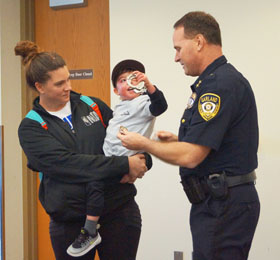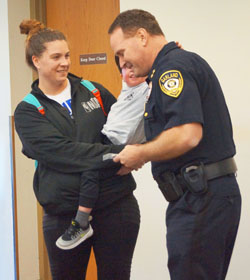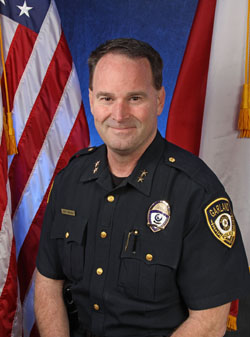Garland Police Chief Jeff Bryan was the week 13 speaker for the Citizens Police Academy. He talked about the health, both psychological and physiological, of the police officers.
“There are psychological issues because of the stuff we see in this job,” Bryan said. “These rookies are going to see in their first year more than anyone should have to see in a lifetime.”
The chief is dedicated to the health and well-being of the officers and believes that psychological and physiological issues caused by the job have not been given enough attention.
Bryan reached out to a group of doctors at Baylor Scott & White – Dallas to learn more about the problem as well as how to best help the officers. One of the doctors has joined the force and provides support in a variety of situations.
He explained that Post-Traumatic Stress Disorder is an issue in law enforcement. To have PTSD, one must have been threatened with death, experienced serious injury or sexual violence. They must have been involved in the incident or witnessed it in-person. Officers often experience PTSD because of repeated exposure to extreme adverse events and details.
Exposure is the first element in PTSD. The second is intrusion, which is when the person relives the event over and over and maybe wakes up in the middle of the night thinking or dreaming about it (must be recurring). The third element is avoidance. The person tries to avoid what they are experiencing. All three elements must be present for a PTSD diagnosis. The avoidance must be treated.
“You can’t just get over it,” he said. “We have to treat it, confront what is going on with the officer.”
 One of the challenges is that often officers won’t ask for help because of the stigma attached to seeing the police psychologist.
One of the challenges is that often officers won’t ask for help because of the stigma attached to seeing the police psychologist.
“That’s why I teamed up with this group at Baylor. It’s trauma psychology, the same that is used for the military,” Bryan said. “Officers can reach out to this group without having to tell their supervisor, boss or chief. We wanted a program that is anonymous.’
Things are very different physiologically for officers and civilians. Bryan used an example in which a civilian is awakened by a loud noise from inside the house. This puts the person in a threat-based state which quickly becomes hypervigilance.
Officers are constantly in a threat-based state and must be taught how to put themselves in a hypervigilant state to react appropriately to everyone they come in contact with. They are trained to think that every person is the one with a gun
“Bad guys don’t wear name tags,” Bryan said. “If they don’t handle every call like it’s “that call,” they might not go home that night.”
Being hypervigilant every day for 10-12 hours throughout their careers can do extreme damage.
Adrenaline and cortisol are dumped into the body because those chemicals are needed to maintain hypervigilance. The problem, though, is that this happening every day of an officer’s career, and it changes the body, the way the mind works and causes extreme wear and stress on vital organs.
“The chemical dumping into our bodies is killing us. You’re on top of your game in the hypervigilant state, but for every action, there is an equal and opposite reaction,” Bryan said. “Officers are in a hypervigilant state at work, then they crash when they go home. Their bodies go through all kinds of changes. The wife lives with the crashed guy.”
The crash, which looks like depression. becomes a schedule of Go to work and all is great; go home and you’re depressed. And this happens day after day. Some officers turn to self-medication with alcohol or other substances. Long term complications include obsessive behaviors, physical and mental exhaustion, relationship difficulty, cynicism, sleep deprivation and digestive illnesses.
The startling facts are that 124 law enforcement officers were killed in the line of duty last year and 167 committed suicide. Nine New York officers have committed suicide this year.
Bryan is committed to the well-being of Garland’s police officers and continues to research, learn, consult with trained psychologists and implement easily accessible, effective programs.


